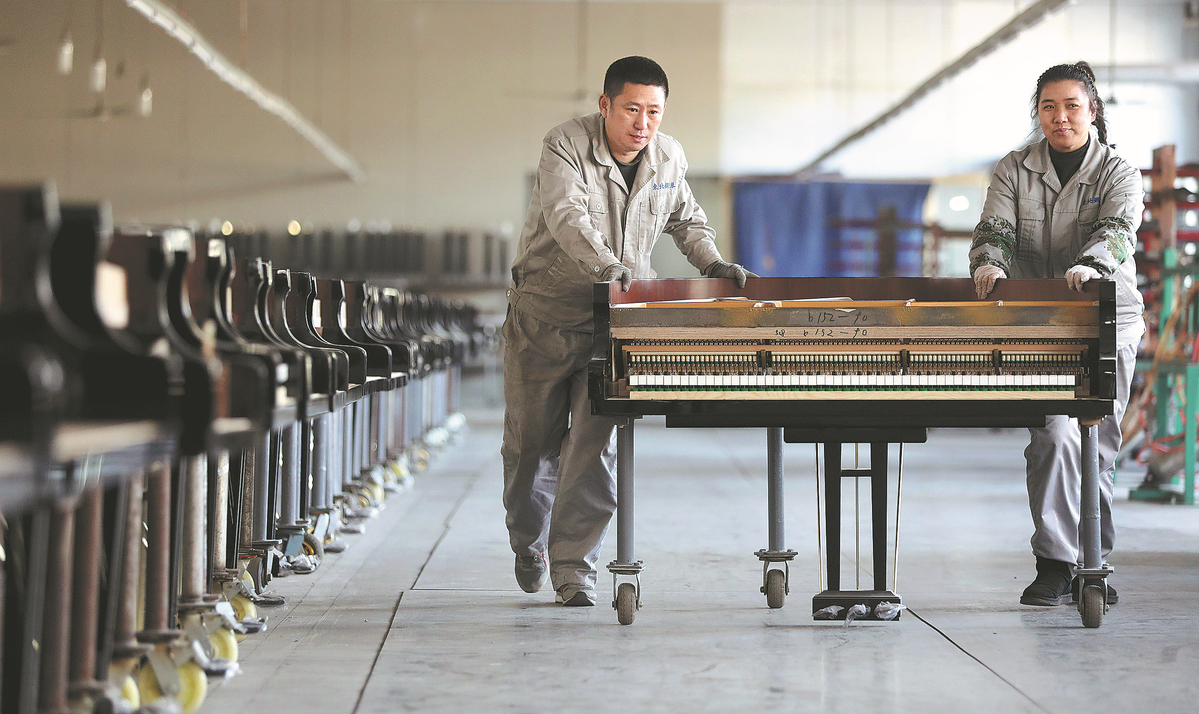Declining piano sales a sign of shift in focus
Less stress put on arts training amid changes in education policies






Born into a family of limited means in a small county in Northeast China's Liaoning province, Zhang Xin was envious of her classmates who had the opportunity to learn to play the piano.
When she became a mother, she did not want her daughter to miss out in the same way. So when her daughter Wang Yuhan started kindergarten, Zhang bought a piano and signed her daughter up for piano classes.
One day Zhang returned home from work to find that Wang had quarreled with her grandmother, who usually supervised her piano practice. Zhang learned that Wang was overwhelmed by schoolwork, but her grandmother was still insisting on an hour of piano practice a day, which led to the quarrel.
Wang, 10, is now in grade four and Zhang plans to stop her piano lessons before she enters grade five later this year, so that she can focus on her schoolwork.
"A friend told me that a large number of children hadn't touched the keyboard after achieving grade 10 (the highest level of the piano exam for learners)," Zhang said. "Piano has left them with painful memories and is seen as a burden, so I decided to let go."
Zhang's experience is a poignant note on the declining sales of the piano, once known as the "king of instruments" in China, from its peak a few years ago.
The business fortunes of two major domestic brands reflect a dramatic drop in the sector. In the first three quarters of 2023, the net profit of Hailun Piano, a leading manufacturer, fell 24.7 percent year-on-year. Meanwhile, the net profit of PR Piano Art Studio, a reputable institution that offers piano lessons nationwide, plummeted 93.5 percent year-on-year to 6.47 million yuan ($905,364).
Li Yang, co-owner of a music training institution in Nanjing, Jiangsu province, acknowledges the downturn in the music business. His institution enrolled 15 to 20 piano students a month during the golden era of music education from 2016 through 2020, but now it has only five students.
"The market for arts training is expected to shrink because piano learning is no longer a rigid demand," Li said.
The emphasis parents place on arts training has changed along with the changes in their financial situations and the nation's education policies. Some have shifted their children's focus to schoolwork, or have chosen to invest in instruments less expensive than the piano.
The Ministry of Education has canceled a measure that gave additional marks in high school entrance exams to students specializing in the arts or sports, meaning that high piano grades no longer offer an advantage in high school enrollment.
Liu Yunlong, operator of a piano training institution in Beijing, said he has a dozen regular students.
"I noticed that the number of parents asking about buying a piano dropped last year," Liu said. "Not all families can afford a home spacious enough to accommodate a piano, especially in areas near top schools in Beijing."
Even though piano sales dropped last year, the demand for piano training in big cities such as Beijing remains steady.
About half of the space at Jiangjie Music Group's training center in the Chinese capital is occupied by 12 small piano classrooms, with the other half displaying dozens of pianos. On an afternoon last week, five children practiced for three hours, either by themselves or with a teacher.
Ma Sen, head of the training center in Bejing's Anzhen area, said that more than 200 children ages 4 to 12 take lessons there, with the number having rebounded to a steady level after a drop during the COVID-19 pandemic.
Noting that an hour of piano lessons costs about 300 yuan, Ma said it usually takes parents one to six months to see if their children have an interest in or gift for playing the piano before deciding to buy one. The store sells about 20 pianos a month, with prices ranging from 40,000 yuan to 150,000 yuan.
Although Beijing's piano market is still stable, he said it cannot compare with its heyday in 2015, when his store sold about 40 pianos each month.
"In the past, parents scrambled to buy pianos and cultivate the musical talent of their children, but now their goal is trying to develop their children's hobbies," Ma said.
Some students give up practice after a few months and their parents, most of whom are burdened with busy work schedules and financial concerns, are more rational, he said.
"They are too busy to accompany their children for piano classes on weekdays, so usually grandparents come to pick up the students," he added.
However, the piano is still the first choice of parents and a basic step for children who are really keen on musical instruments, according to Ma.
"I don't think the interest in learning the piano is cooling down, at least not in my training center," he said.
Contact the writers at [email protected]
- Surging flu cases drive up demand for drug
- Nanchang funds 19 free funeral venues after tragedy
- Massive ice sculpture replicates CNS?Liaoning aircraft carrier
- China to enhance to improve carbon footprint
- Experts advocate vaccinations to combat flu cases
- Singer Lu Han apologizes for inappropriate behavior

































